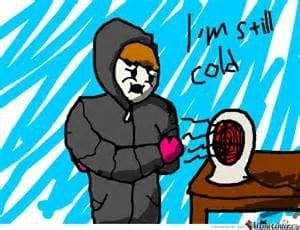Why Am I Always Cold?

If you’ve ever worked in a cube farm, you know the difficulty of establishing a temperature that suits everyone. As someone who was cold natured, I frequently wore a sweater in the office on sweltering August days. Now that I work from home, I have complete control of the environmental temperature in my work space. While there are factors that influence how cold natured you are, such as low body fat, being cold could be a symptom of a health condition.
The most common condition that causes one to feel cold is anemia. Anemia is a blood disorder caused by a shortage of red blood cells, which carry oxygen throughout the body. One of the functions of these cells is the regulation of body temperature. The Mayo Clinic identifies the symptoms of anemia as cold hands and feet, as well as fatigue, shortness of breath, dizziness and others. Anemia has a variety of underlying causes, including iron deficiency, infections, cancer or kidney disease, and genetics.
Another cold culprit is low blood pressure. Low pressure means less blood — and therefore less oxygen — is flowing to the organs and extremities, which can make a person feel cold. The U.S. health department’s National Heart, Lung and Blood Institute notes other symptoms of the condition that are similar to those of anemia – dizziness, fainting, fatigue, nausea and blurred vision.
Raynaud’s Phenomenon, a restriction in blood vessels makes those who have it feel cold, among other symptoms, can be caused by many things such as lupus, carpal tunnel syndrome or certain medications. Ironically, often is caused by living in a place that is frequently cold.
Thyroid or pituitary glands could also be making you cold if either gland is not active enough. People without enough thyroid hormone often feel colder, fatigued, forgetful and depressed, and could have dry skin and constipation. This condition is known as hypothyroidism. The thyroid gland is located in the neck and is stimulated by the pituitary gland, so hypopituitarism, underperformance of the pituitary gland, can also cause much of the same issues as a low-functioning thyroid.
Did you know that anxiety can make you feel cold? Anxiety is linked to humans’ “fight or flight” instinct, and so during times of high stress will direct blood toward the core organs and away from the extremities in order to protect what is most important for survival.
We all have a different “running temperature”, so being cold may not be an indicator of a health concern. Very often the office thermostat is set for those who tend to be a bit warmer. If you are a cold natured soul, you sometimes have to bring a fleece jacket to work and make due!

















